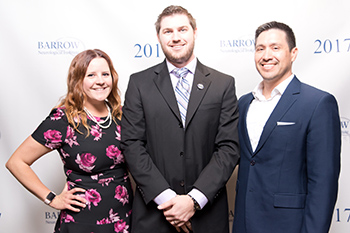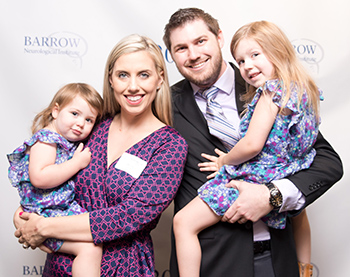Dr. Ian Crain to lead Banner Brain Injury Center
Banner – University Medical Center Phoenix has plans to put a greater emphasis on the care and treatment of traumatic brain injuries, with a University of Arizona College of Medicine – Phoenix alumnus leading the charge.
Neurologist Ian Crain, MD, was named director of Banner’s Brain Injury Center earlier this summer. He is an associate professor at the College and a member of the Class of 2012.
Dr. Crain completed a residency in neurology and a one-year fellowship in sports neurology at Barrow Neurological Institute at St. Joseph’s Hospital and Medical Center. He assumes the title of Director of the Brain Injury Center and also will work in the Banner Concussion Center with Steven Erickson, MD.

His Barrow fellowship included treating traumatic brain injury with a focus on sports-related mild traumatic brain injuries and concussions. The training highlighted the need for a multi-disciplinary approach to this complex injury, he said.
“It takes a team to provide comprehensive care, including therapists, neuropsychologists, optometrists and physicians,” Dr. Crain said.
He remains involved at the College of Medicine as an associate professor, and he and his wife attended the College of Medicine – Phoenix student retreat in Payson in August to offer advice to incoming students. He met his wife, Allison, during medical school. She attended the UA College of Medicine – Tucson for two years before moving to the Phoenix campus.
Dr. Crain said he wanted to speak with the medical students, because hearing from other students helped him when he was in medical school.
“I learned a lot from people coming in to speak with us who were outside of academics and were not just giving a lecture, but were proving an insight into their careers in medicine,” Dr. Crain said.
He advised current first-year students to avoid becoming something they are not.

“Medical school is not going to — and it shouldn’t — change who you are,” Dr. Crain said. “Who you are before medical school is going to be who you are afterwards. What you are doing is not just four years of medical school or three to seven years of residency,” he said. “We are talking about your entire life.”
Dr. Crain attended Arizona State University on a pre-med track, majoring in Psychology. Through his undergraduate experience, he was able to participate in research labs where it cemented his decision to follow a career in medicine, which led him to the College of Medicine – Phoenix.
Dr. Crain was not accepted into medical school the first time he applied. “Rejection is not the end of the world,” he said. “It is actually a normal part of life and it should better you. You are not ‘less than’ because of it; you are actually ‘more than.’ ”
He said the challenge of not getting accepted the first time gave him the time to reflect on whether he wanted to apply again. He ended up working and taking courses at ASU that he wasn’t able to take the first time around. Ultimately, this strengthened his application and his drive to continue pursuing medicine.
“My decision to become a neurologist and focus on traumatic brain injury started during my first year of medical school,” Dr. Crain said. “My community mentor was Dr. Anais Sonder at the Phoenix VA. Many of her clinic patients had traumatic brain injury and their complex cases sparked my interest in the area.”
About the College
Founded in 2007, the University of Arizona College of Medicine – Phoenix inspires and trains exemplary physicians, scientists and leaders to advance its core missions in education, research, clinical care and service to communities across Arizona. The college’s strength lies in our collaborations and partnerships with clinical affiliates, community organizations and industry sponsors. With our primary affiliate, Banner Health, we are recognized as the premier academic medical center in Phoenix. As an anchor institution of the Phoenix Bioscience Core, the college is home to signature research programs in neurosciences, cardiopulmonary diseases, immunology, informatics and metabolism. These focus areas uniquely position us to drive biomedical research and bolster economic development in the region.
As an urban institution with strong roots in rural and tribal health, the college has graduated more than 1,000 physicians and matriculates 130 students each year. Greater than 60% of matriculating students are from Arizona and many continue training at our GME sponsored residency programs, ultimately pursuing local academic and community-based opportunities. While our traditional four-year program continues to thrive, we will launch our recently approved accelerated three-year medical student curriculum with exclusive focus on primary care. This program is designed to further enhance workforce retention needs across Arizona.
The college has embarked on our strategic plan for 2025 to 2030. Learn more.